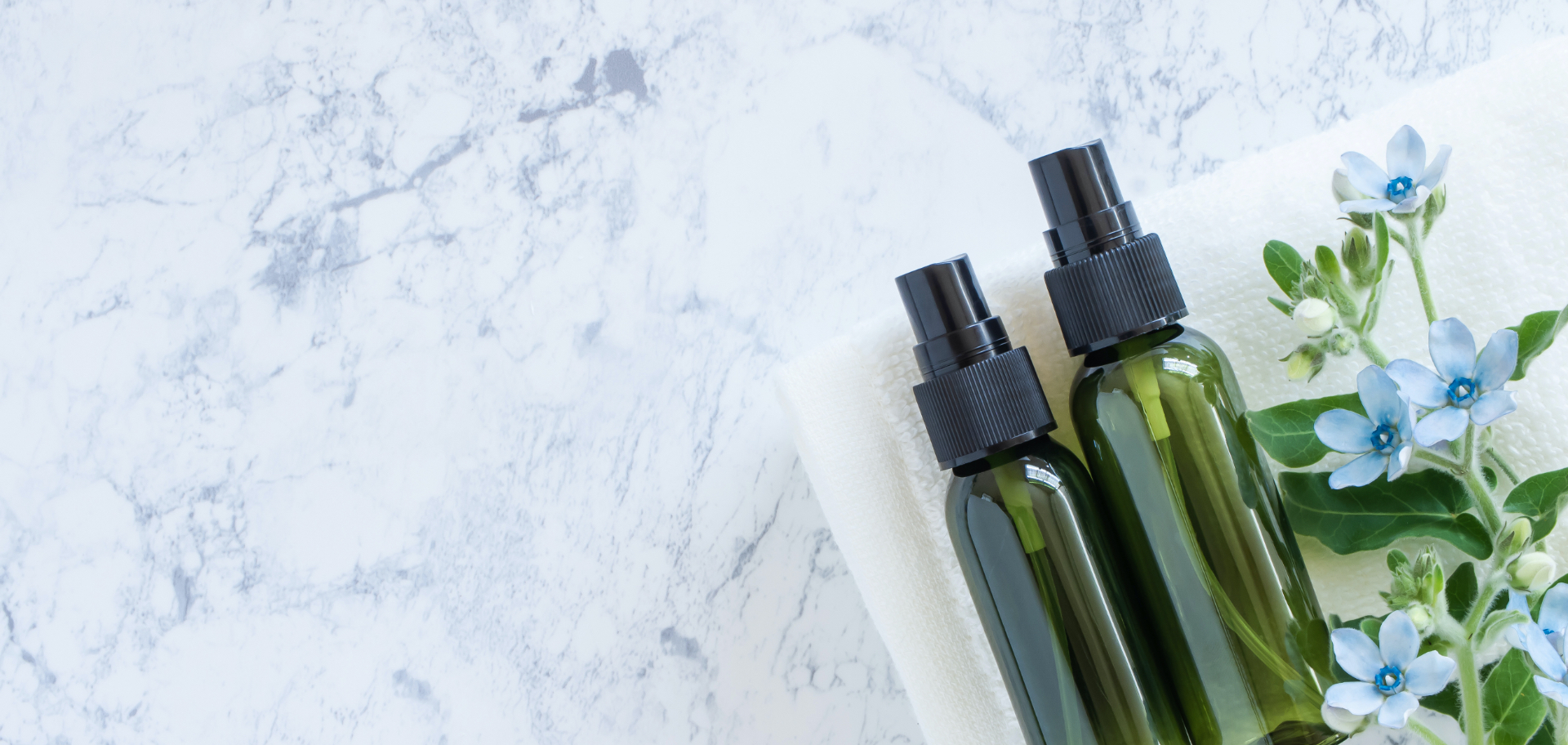
Spray bottle
From glass cleaners to horse grooming products and surface disinfectants
The spray bottle and its various designs
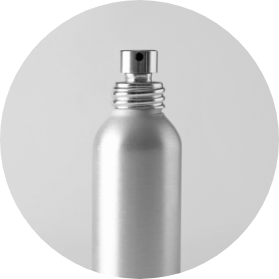
Schild Labs also offers contract filling of spray bottles. Comprising a bottle body plus atomiser cap for spraying the liquid, these spray bottles are used for household cleaning products, pet care products and disinfectants. Spray bottles are also used for spraying concentrates diluted with water. Modern spray bottles work with a pump mechanism attached to a siphon tube that extends to the bottom of the bottle. They are operated by pulling a lever or pressing a button on the bottle cap. In this way, the liquid is sucked upwards and forced through a nozzle. Depending on the design, a stream or a fine mist is produced. Using this device, you can spray the liquid evenly across a surface. If the bottle has a spray button, it usually comes with a cap to protect the nozzle from getting clogged with dirt.
The spray bottle is available in different versions: as a hand spray bottle, pressure spray bottle, overhead spray bottle and foam sprayer. These models differ in how they work. The hand spray bottle, which is simply operated by a lever, is widely used. The overhead spray bottle is even more convenient. It sprays even when held upside down, making it suitable for hard-to-reach places. The pressure spray bottle is a more elaborate version, which has an integrated pump. The user pressurises the sprayer, which forces the liquid out. The spray is actuated by pressing the lever. Some models even have a locking function to enable continuous spraying with minimal effort. The foam spray bottle has a special nozzle function that creates the foam.

Advantages and disadvantages of the spray bottle
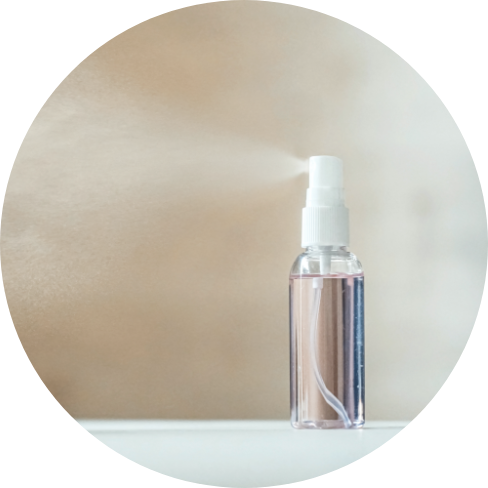
The particular advantage of the spray bottle is that it is both convenient and efficient to use, which makes it a practical choice for cleaning and care products and disinfectants. The liquid can be applied accurately in the form of a mist or fine foam, which is distributed evenly across the surface. Another advantage of the spray bottle is that the user does not need to bend over the surface.
A wider distribution can be achieved with a pressurised spray. The spray bottle is a time-saving means of disinfection, and the disinfectant spray dries quickly due to the high alcohol content. However, the spray mist can easily be inhaled when applying cleaning products, which may be harmful to health.

Typical products for the spray bottle in contract filling
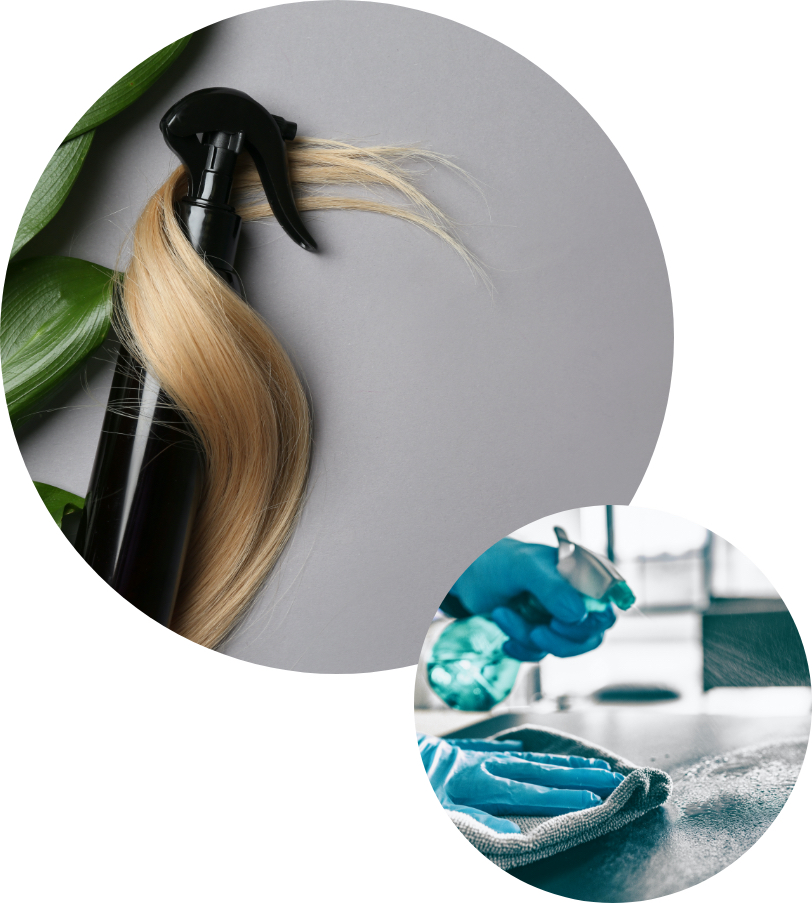
Filling spray bottles is one of the services offered by a contract manufacturer. A range of versions are available for different products. One of the principal uses of the spray bottle is for cleaning products. In this diverse market, a great many products are available in spray bottles, but we recommend using a packaging designed specifically for your individual product. We carry out contract filling based on the manufacturer’s ideas and specifications. The range of cleaning products includes oven and barbecue cleaners, stainless steel cleaners, multipurpose cleaners, glass cleaners, upholstery fresheners, limescale removers and bathroom cleaners. The spray bottle is convenient to use, and also ideal for respraying heavy dirt and tough stains. Manufacturers can choose a suitable container with pumping mechanism for contract filling of their product. Spray bottles are also suitable for surface disinfectants. Another product category in which the spray bottle is widely used is animal sprays, especially in equestrian sports. Bridle cleaner, insect repellent and mane and tail care products are popular products in the practical spray bottle, which make it easier for horse owners to care for their animals. The handy spray bottle is also used in the cosmetics sector for hair sprays, hair repair products, volumisers and perfumes. In contract manufacturing and filling, it is important to choose the right packaging for the product. It must fulfil a dual function: storing the contents safely, on the one hand, and offering an attractive shape and design for marketing purposes, on the other hand.
Sizes, materials and the use of the spray bottle

A range of spray bottle designs are available for contract filling, including both small and large capacities plus different shapes and materials. Hand spray bottles are the most widely used. They are usually made of plastic and have a bulbous shape with a narrow neck. For cleaning products, however, flat spray bottles are often be used. This design is particularly practical because it is easy to grip while operating the spray trigger with your finger and holding a sponge or cloth for wiping in the other hand. Another version is the spray bottle with a cylindrical body. Plastic and glass are the commonly used materials for spray bottles, with plastic containers being popular for cleaning products, chemicals and care products. Containers made of polyethylene (HDPE) are chemical-resistant and sturdy.
The spray bottle’s valve spring and ball are also resistant to many substances. The plastic can be coloured through in white, but is also available in a semi-transparent version. Suitable plastics are HDPE, LDPE and PET. Spray bottles made of glass are more commonly used for cosmetics and pharmaceutical products. Light-protection brown glass bottles for nasal spray are available in sizes down to 20 ml. Small glass bottles with an atomiser are widely used for perfumes. In the field of ecological cleaning agents, glass spray bottles are used as an alternative to plastic. For more frequent, professional use, stainless steel spray cans are another option. There is a wide choice of sizes for spray bottles, ranging from 50 ml to 1000 ml. The 500 ml size is popular for cleaning products, while for products that are dispensed in larger quantities, canisters with single-use dispensers are an alternative. These are available in sizes from 5 to 10 litres.
A range of spray bottle designs are available for contract filling, including both small and large capacities plus different shapes and materials. Hand spray bottles are the most widely used. They are usually made of plastic and have a bulbous shape with a narrow neck. For cleaning products, however, flat spray bottles are often be used. This design is particularly practical because it is easy to grip while operating the spray trigger with your finger and holding a sponge or cloth for wiping in the other hand. Another version is the spray bottle with a cylindrical body. Plastic and glass are the commonly used materials for spray bottles, with plastic containers being popular for cleaning products, chemicals and care products. Containers made of polyethylene (HDPE) are chemical-resistant and sturdy.
The spray bottle’s valve spring and ball are also resistant to many substances. The plastic can be coloured through in white, but is also available in a semi-transparent version. Suitable plastics are HDPE, LDPE and PET. Spray bottles made of glass are more commonly used for cosmetics and pharmaceutical products. Light-protection brown glass bottles for nasal spray are available in sizes down to 20 ml. Small glass bottles with an atomiser are widely used for perfumes. In the field of ecological cleaning agents, glass spray bottles are used as an alternative to plastic. For more frequent, professional use, stainless steel spray cans are another option. There is a wide choice of sizes for spray bottles, ranging from 50 ml to 1000 ml. The 500 ml size is popular for cleaning products, while for products that are dispensed in larger quantities, canisters with single-use dispensers are an alternative. These are available in sizes from 5 to 10 litres.
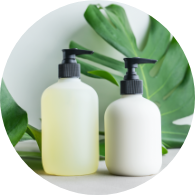
Contact:
How can we help you?
Do you have a question about our product range? Or perhaps you're looking for a special formulation for your cosmetics, household chemicals or food supplements. As experts in contract filling, we will develop a customised solution to suit you and your company. Please send us your enquiry online using our convenient contact form, or phone us on +49 (0) 421-408845-0.
How can we help you?
Contact:
Do you have a question about our product range? Or perhaps you're looking for a special formulation for your cosmetics, household chemicals or food supplements. As experts in contract filling, we will develop a customised solution to suit you and your company. Please send us your enquiry online using our convenient contact form.